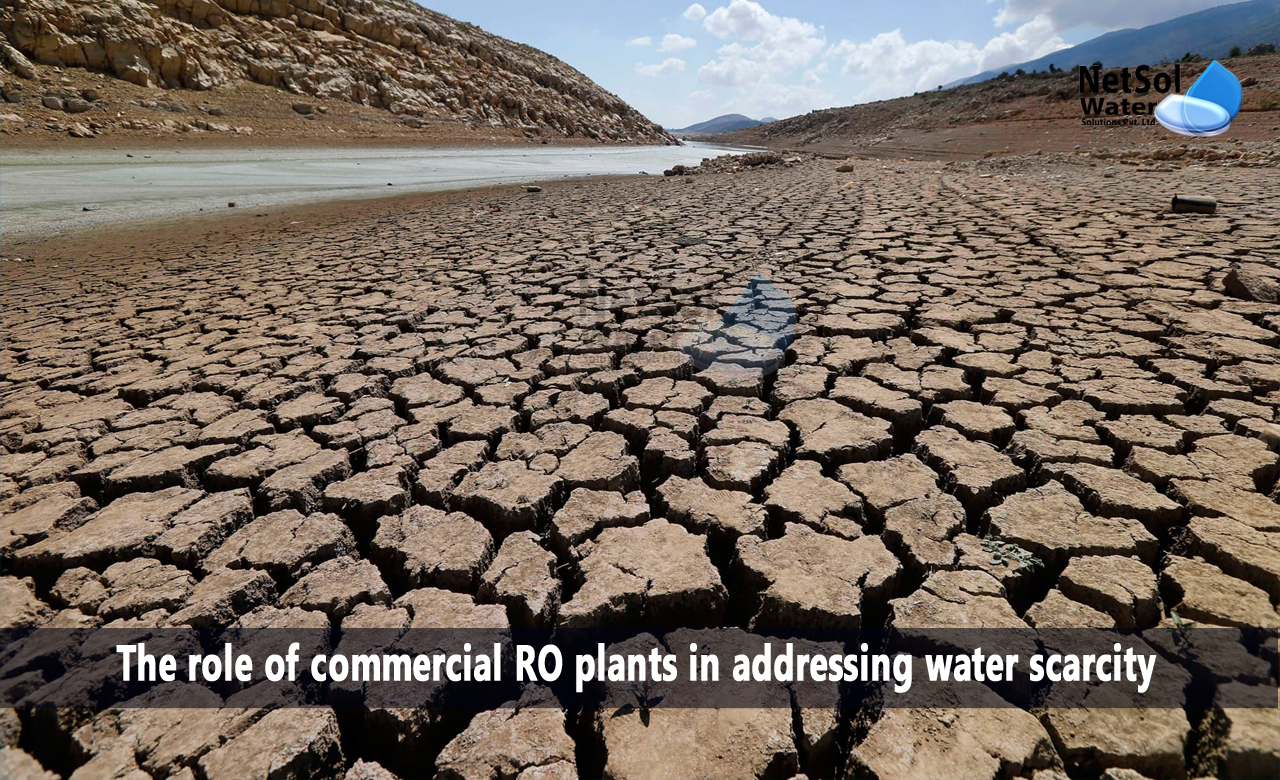What is the role of commercial RO plants in addressing water scarcity?
Water scarcity is a pressing global issue, and industries play a significant role in water consumption. Commercial reverse osmosis (RO) plants have emerged as an effective solution for promoting water conservation and efficiency in various sectors.
Here we will find out the role of commercial RO plants in addressing water scarcity, highlighting their benefits, operation, and considerations.
Understanding Reverse Osmosis Technology
We can have a basic understanding of RO technology due to following reasons:
1. Principles of Reverse Osmosis:
Reverse osmosis is a water treatment process that utilizes a semipermeable membrane to remove impurities, dissolved solids, and contaminants from water. Through the application of pressure, water molecules are forced through the membrane, leaving behind the impurities and producing purified water.
2. Operation of Commercial RO Plants:
Commercial RO plants consist of several components, including pre-treatment units, high-pressure pumps, RO membranes, and post-treatment units. The pre-treatment phase removes suspended solids, sediments, and organic matter, ensuring the optimal performance of the RO membranes. The RO process separates dissolved salts and contaminants, producing high-quality water suitable for various applications.
Benefits of Commercial RO Plants in Water Conservation and Efficiency
Some of benefits of commercial RO plants in water conservation and efficiency are as follows:
1. Water Reuse and Recycling:
Commercial RO plants enable the reuse and recycling of water resources, promoting water conservation. They can treat wastewater, brackish water, and other non-potable water sources, transforming them into usable water for industrial processes, irrigation, and other applications. By recycling water, RO plants reduce the strain on freshwater sources and minimize overall water consumption.
2. Reduction of Water Loss:
RO plants contribute to water efficiency by minimizing water loss. Traditional water treatment processes often result in significant water waste due to the high reject or brine stream generated. However, RO plants operate with high efficiency, minimizing water waste and maximizing water recovery rates. The reject stream can be managed through appropriate brine disposal methods or even further treated for reuse.
3. Improved Water Quality:
Commercial RO plants produce high-quality water free from contaminants, dissolved solids, and impurities. This purified water can be utilized in various industries, such as food and beverage, pharmaceuticals, and power generation, where water quality is crucial for product integrity and operational efficiency. By providing a consistent and reliable supply of clean water, RO plants enhance process performance and reduce the need for additional water treatment steps.
Considerations and Implementation
Some considerations and implementations are as follows:
1. Feedwater Source Selection:
Choosing the appropriate feedwater source is essential for commercial RO plant implementation. It can include brackish water, seawater, or industrial wastewater. Assessing water quality, availability, and accessibility helps determine the most suitable feedwater source for treatment. Conducting thorough water analysis ensures the compatibility of the source with RO technology and minimizes the risk of membrane fouling and scaling.
2. System Design and Optimization:
Proper system design and optimization are critical for maximizing the efficiency of commercial RO plants. Factors such as feedwater quality, desired water production, recovery rates, and energy consumption need to be considered during the design phase. Optimizing system parameters, such as pressure, flow rates, and membrane selection, can improve water recovery rates and minimize energy consumption.
3. Monitoring and Maintenance:
Regular monitoring and maintenance of the commercial RO plant are necessary to ensure optimal performance and longevity. Monitoring feedwater quality, pressure differentials, permeate quality, and system efficiency helps identify any deviations or issues promptly. Routine maintenance, including membrane cleaning, replacement, and system integrity checks, ensures consistent and reliable operation.
Summary:
Commercial reverse osmosis plants play a vital role in promoting water conservation and efficiency. By enabling water reuse and recycling, reducing water loss, and producing high-quality water, these plants contribute to sustainable water management practices. Proper consideration of feedwater sources, system design, and optimization, along with regular monitoring and maintenance, are essential for the successful implementation of commercial RO plants. With their efficient operation and contribution to water conservation, commercial RO plants are key allies in addressing water scarcity challenges and promoting a more sustainable future.
Leading manufacturer of sewage treatment plants in India.
Netsol Water is the leading manufacturer, supplier, and exporter of a quality selection of water treatment, and wastewater treatment products in India, by using advanced sewage treatment methods.
RO plants, water softeners, ETPs, STPs, DM plants, AMC, O&M, Ultra filtration, UV, Ozonation, ZLD plants, Anoxic tanks, and other goods and services are available from us. We also provide services to businesses in sectors including automotive, pharmaceutical, textile, pulp & paper, beverages, refineries, schools, hospitals, office buildings, and hotels, among others.
Netsol Water is Greater Noida-based leading water & wastewater treatment plant manufacturer. We are industry's most demanding company based on client review and work quality. We are known as best commercial RO plant manufacturers, industrial RO plant manufacturer, sewage treatment plant manufacturer, Water Softener Plant Manufacturers and effluent treatment plant manufacturers. Apart from this 24x7 customer support is our USP. Call on +91-9650608473, or write us at enquiry@netsolwater.com for any support, inquiry or product-purchase related query.



